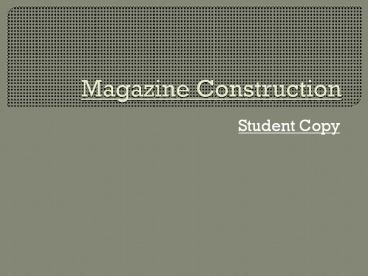Conventions PowerPoint PPT Presentation
Title: Conventions
1
Magazine Construction
- Student Copy
2
Conventions
- What you get on front covers
3
1.
Masthead
8.
Selling Line or Banner
Web-links? Ears?
9.
Tagline
2.
Kicker
10.
Feature Article Photo
3.
Cover Line
11.
Headline
12.
Anchorage
4.
Secondary Lead
13.
Flash
14.
Menu Strip
5.
Plug
6.
Graphic Feature or Puff
FREE Live music downloads
15.
Bar Code
16.
Date Line
Caption
7.
4
1.
Masthead
8.
Selling Line or Banner
Web-links? Ears?
9.
Tagline
2.
Kicker
10.
Feature Article Photo
3.
Cover Line
11.
Headline
12.
Anchorage
4.
Secondary Lead
13.
Flash
14.
Menu Strip
5.
Plug
6.
Graphic Feature or Puff
15.
Bar Code
16.
Date Line
Caption
7.
5
Conventions Notes
Graphic Feature or Puff
- The Graphic Feature or Puff on the NME magazine
looks smart. - It fits the style of the magazine, additionally,
its sticking with its colour scheme as its
Black, white and red, as is the majority of the
rest of NME. - The style is simple yet appealing and its not
too crowded. - The smart-looking lifestyle I feel is hinted at
in NME, as the magazine on all whole, is well
presented and simple. - I think the main cover photo is the most
important section of the Magazine as its the
main thing which draws people in. Its the first
thing you notice. - Even before the masthead. The tone used in NME
is formal and informative.
6
Noticing Conventions
- What does the masthead tell you about the
magazine? - How does the anchorage help to create meaning
with the photo? - Do the graphic features tell you anything about
the style of the magazine? - Does the way things are phrased or designed
(including taglines, flashes, quotes etc) give
you hints about lifestyle the audience and
artists are expected to have? - Do the fonts and colours communicate a certain
style or approach? - What impression do you get about the artist
judging by the photographic styles and techniques
e.g. positioning, mode of address etc.? - How does it arrange the space on the page to tell
you what is most important? - How do the kickers and cover lines work?
- What is missing from the list of conventions and
is that significant i.e. is it less important?
7
Design
- How front covers are conceived and laid out
8
Simple plain Background-Fits the music genre the
artist belongs to as its simple and not fancy.
As Is the lifestyle of the music artist
Clothes somewhat reflect the style of music they
play. Loose, and comfortable.
Direct mode of address-Quite forward-Possibly
trying to intimidate the viewer.
Crossed Arms-Defensive of his new album
9
Direct mode of address can appear in yer face,
serious, warm
Indirect mode of address can be mysterious,
lively, sombre
Creates a wacky, fun image, sharing an identity
with the reader that offers the independence of
indie music.
Enigma what are they getting up to now?
10
House Style Design Notes
Style NME has a smart style to it. The layout and
presentation of the magazine is very organized
and clear, giving it a very professional look to
it. The cover images contribute to this as well.
Although the cover images have different styles
overall, the general look of them are appealing.
The Mode of address (The majority of the time)
is direct. The person on the front cover is
looking straight out at you. Depending on the
topic of the magazine (Basically why that person
is there) the person can have a relaxed face to a
face of pure confusion or anger, it all depends
on the subject matter.
Colour scheme NME has a colour scheme of Red,
White and Black. The red tends to be used as a
background for the text (which is usually white)
and I feel it makes the text stand out a lot more
than if the text was without a background. The
colour black is usually used as both. For example
you can see how Black is used on these magazines
Fonts NME makes good use of the fonts. Relating
it to the genre/sub genre of music which is on
the front cover. As you can see on the left
magazine, the font looks like its been drawn on.
Giving it the impression of being quite
hard/tough. On the right the text is very clear
and smart. Giving the rest of the magazine a
matching style.
Use of Space The use of space in NMEs Magazines
tend to differ depending again on the main topic
the cover page is showing. For example the left
magazine (Above) uses white space around the main
image to give the border of the image a cleaner
look, as the text in the middle is very messy and
theres a lot of it. On the right the magazine
has a lot of space giving it a clearer, smarter
look, and doesnt use a lot of text.
- CONCLUDE Why do you think it is designed as it
is? Does it reinforce or challenge the typical
conventions? Is it poster-style, busy , loud,
inyerface, smooth, slick, stylish, fun etc.?

